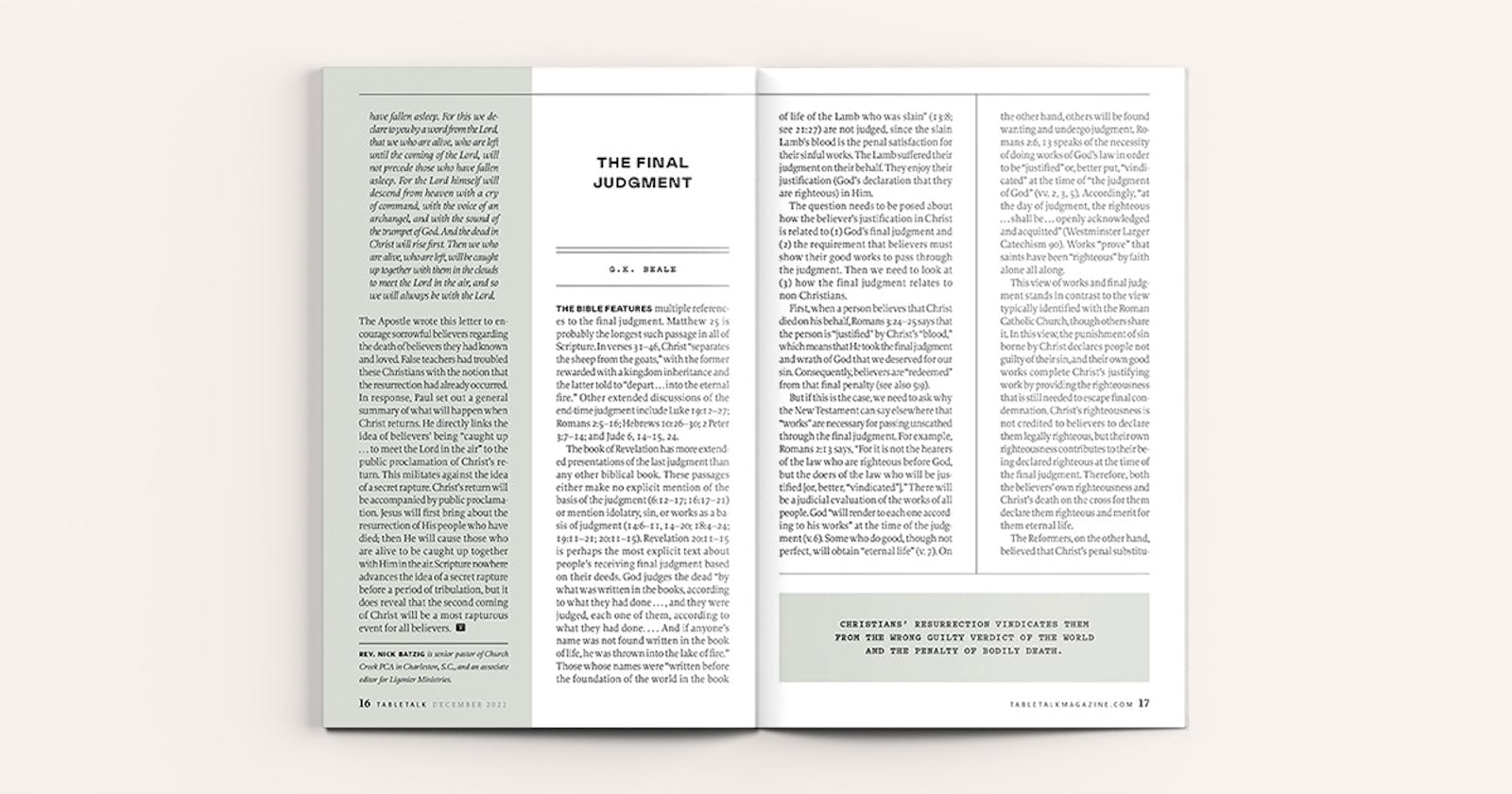
Request your free, three-month trial to Tabletalk magazine. You’ll receive the print issue monthly and gain immediate digital access to decades of archives. This trial is risk-free. No credit card required.
Try Tabletalk NowAlready receive Tabletalk magazine every month?
Verify your email address to gain unlimited access.
The Bible features multiple references to the final judgment. Matthew 25 is probably the longest such passage in all of Scripture. In verses 31–46, Christ “separates the sheep from the goats,” with the former rewarded with a kingdom inheritance and the latter told to “depart . . . into the eternal fire.” Other extended discussions of the end-time judgment include Luke 19:12–27; Romans 2:5–16; Hebrews 10:26–30; 2 Peter 3:7–14; and Jude 6, 14–15, 24.
The book of Revelation has more extended presentations of the last judgment than any other biblical book. These passages either make no explicit mention of the basis of the judgment (Rev. 6:12–17; 16:17–21) or mention idolatry, sin, or works as a basis of judgment (Rev. 14:6–11, 14–20; 18:4–24; 19:11–21; 20:11–15). Revelation 20:11–15 is perhaps the most explicit text about people’s receiving final judgment based on their deeds. God judges the dead “by what was written in the books, according to what they had done . . . , and they were judged, each one of them, according to what they had done. . . . And if anyone’s name was not found written in the book of life, he was thrown into the lake of fire.” Those whose names were “written before the foundation of the world in the book of life of the Lamb who was slain” (Rev. 13:8; 21:27) are not judged, since the slain Lamb’s blood is the penal satisfaction for their sinful works. The Lamb suffered their judgment on their behalf. They enjoy their justification (God’s declaration that they are righteous) in Him.
The question needs to be posed about how the believer’s justification in Christ is related to (1) God’s final judgment and (2) the requirement that believers must show their good works to pass through the judgment. Then we need to look at (3) how the final judgment relates to non-Christians.
First, when a person believes that Christ died on his behalf, Romans 3:24–25 says that the person is “justified” by Christ’s “blood,” which means that He took the final judgment and wrath of God that we deserved for our sin. Consequently, believers are “redeemed” from that final penalty (see also Romans 5:9).
But if this is the case, we need to ask why the New Testament can say elsewhere that “works” are necessary for passing unscathed through the final judgment. For example, Romans 2:13 says, “For it is not the hearers of the law who are righteous before God, but the doers of the law who will be justified [or, better, “vindicated”].” There will be a judicial evaluation of the works of all people. God “will render to each one according to his works” at the time of the judgment (Rom. 2:6). Some who do good, though not perfect, will obtain “eternal life” (Rom. 1:7). On the other hand, others will be found wanting and undergo judgment. Romans 2:6, 13 speaks of the necessity of doing works of God’s law in order to be “justified” or, better put, “vindicated” at the time of “the judgment of God” (Rom. 2:2, 3, 5). Accordingly, “at the day of judgment, the righteous . . . shall be . . . openly acknowledged and acquitted” (Westminster Larger Catechism 90). Works “prove” that saints have been “righteous” by faith alone all along.
This view of works and final judgment stands in contrast to the view typically identified with the Roman Catholic Church, though others share it. In this view, the punishment of sin borne by Christ declares people not guilty of their sin, and their own good works complete Christ’s justifying work by providing the righteousness that is still needed to escape final condemnation. Christ’s righteousness is not credited to believers to declare them legally righteous, but their own righteousness contributes to their being declared righteous at the time of the final judgment. Therefore, both the believers’ own righteousness and Christ’s death on the cross for them declare them righteous and merit for them eternal life.
The Reformers, on the other hand, believed that Christ’s penal substitutionary death legally declared a person not guilty of any sin and that His perfect righteousness is credited to the believer, so that God declares the believer perfectly righteous. At the end of the age, the good (not perfect) works of believers vindicate them and show that in the past they have been justified by Christ alone through faith alone and grace alone. This vindication is not on the same level as Christ’s justification of the believer. “Good works” are the proof that someone already has truly been justified by Christ and are thus a “vindication” of a “justified” state before others. To be clear, “good works” do not ultimately acquit (justify) anyone and grant that person entrance into the eternal kingdom. They grow out of and are the result of Christ’s ultimate justifying work.

An illustration may help clarify the relation between Christ’s justifying work and the “good works” at the end of the age that “save” them. Some large discount store chains in America require an annual fee for the legal privilege of buying their products. Members pay this fee and receive a card that they must present to the local store as evidence of having paid the fee. The card gives a true member entrance into the store, but the card by itself is not the ultimate reason that a person is granted access. The paid fee is a “necessary causal requirement” of store entrance and the evidential card is only a “necessary requirement.” You need to pay the fee and show the card to enter the store, but the fee and the card do not have the same conditional force for getting in. The paid money is a “first order” or “ultimate” condition and the card a “second order” condition.
Similarly, Christ’s justifying penal substitutionary death is the price paid “once for all” (Heb. 9:12; see 9:26–28), and the good works done within the context of Christian faith become the inevitable evidence of such faith at the final judicial evaluation, when the believer is openly acknowledged and acquitted before all. Christ’s work (both His death and His perfect obedience) is the “necessary causal condition” for justification, and the believer’s works are a “necessary (but not ultimately causal) condition’” for “acquittal” before other men. Westminster Confession 11.2 says, “Faith, thus receiving and resting on Christ and His righteousness, is the alone instrument of justification: yet it is not alone in the person justified.”
Works as a vindication of the believers’ earlier justification function together with their bodily resurrection at the final judgment. This resurrection is also a vindication of their earlier justified verdict accomplished by Christ’s redemptive work, showing that Christians have already been justified all along. As was the case with Christ’s bodily resurrection (1 Tim. 3:16), Christians’ resurrection also vindicates them from the wrong guilty verdict of the world and the penalty of bodily death.
Finally, there will be some who are resurrected and may have apparent “good works” at the last judgment but have not believed that Christ took their final judgment upon Himself at the cross and provided them with righteousness. Such people must face their own final judgment, since they will be recognized as guilty of sin and lacking perfect righteousness.
